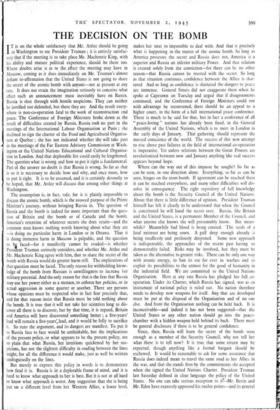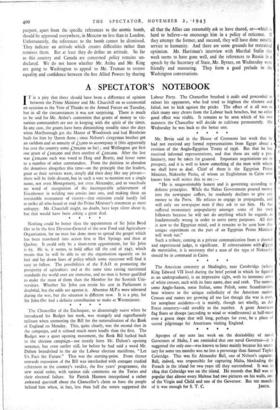THE DECISION ON THE BOMB
IT is on the whole satisfactory that Mr. Attlee should be going to Washington to see President Truman ; it is entirely satisfac- tory that if the meeting is to take place Mr. Mackenzie King, with his ability and mature political experience, should be there too. Where doubts arise is as to the effect the meeting may have in Moscow, coming as it does immediately on Mr. Truman's almost defiant re-affirmation that the United States is not going to share the secret of the atomic bomb with anyone—not at present at any rate. It does not strain the imagination seriously to conceive what effect such an announcement must inevitably have on Russia. Russia is shot through with hostile suspicions. They can neither be justified nor defended, but there they are. And the result every- where is non-co-operation fatal to the work of reconstruction and peace. The Conference of Foreign Ministers broke down as the result of difficulties created by Russia. Russia took no part in the meetings of the International Labour Organisation at Paris ; she declined to sign the charter of the Food and Agricultural Organisa- non at Quebec ; she has not indicated whether she will take part in the meetings of the Far Eastern Advisory Commission at Wash- ington or the United Nations Educational and Cultural Organisa- tion in London. And that deplorable list could easily be lengthened. The question what is wrong and how to put it right is fundamental. Part of the answer no doubt is that Russia is wrong. So far as that is so it is necessary to decide how and why, and once more, how to put it right. It is to be assumed, and it is certainly devoutly to be hoped, that Mr. Attlee will discuss that among other things at Washington.
The assumption is, in fact, safe, for it is plainly impossible to discuss the atomic bomb, which is the avowed purpose of the Prime Minister's journey, without bringing Russia in. The question of RusSia and the bomb is indeed far more important than the ques- tion of Britain and the bomb or of Canada and the bomb. America's retention of whatever secrets she does retain—and the common man knows nothing worth knowing about what they are —is doing no particular harm in London or in Ottawa. That it is doing immense harm in Moscow is palpable, and the question to bb faced—for it manifestly cannot be evaded—is whether President Truman seriously considers, and whether Mr. Attlee and Mr. Mackenzie King agree with him, that to share the secret of the bomb with Russia would do greater harm still. The implications of that question must be faced. The only reason for withholding know- ledge of the bomb from Russian is unwillingness to increase her military potential. And the only reason for that is the fear that Russia may use her power either as a menace, to enforce her policies, or in actual aggression in some quarter or another. There are persons whose opinions must be respected who in fact fear precisely that, and for that reason insist that Russia must be told nothing about the bomb. It is true that it will not take her scientists long to dis- cover all there is to discover, but by that time, it is argued, Britain and America will have discovered something better ; a five-years' lead will remain a five-years.. lead, and it would be folly to sacrifice it. So runs the argument, and its dangers are manifest. To put it to Russia face to face would be unthinkable, but the implications of the present policy, or what appears to be the present policy, are so plain that what Russia, her intuitions quickened by her sus- picions, has not the slightest difficulty in reading between the lines might, for all the difference it would make, just as well be written undisguisedly on the lines.
But merely to express this policy in words is to demonstrate how fatal it is. Russia is in a deplorable frame of mind, and it is hard to know what approach to her is best. But it is not at all hard to know what approach is worst. Any suggestion that she is being put on a different level from her Western Allies, a lower level, makes her next to impossible to deal with. And that is precisely what is happening in the matter of the atomic bomb. So long as America possesses the secret and Russia does not, America is a superior and Russia an inferior military Power. And that relation is created solely from the conviction—for there can be no other reason—that Russia cannot be trusted with the secret. So long as that situation continues, confidence between the Allies is shat- tered. And so long as confidence is shattered the dangers to peace are immense. General Smuts did not exaggerate them when he spoke at Capetown on Tuesday and urged that if disagreements continued, and the Conference of Foreign Ministers could not with advantage be reconvened, there should be an appeal to a higher court, in the form of a full international peace conference. There is much to be said for that, but in fact a conference of all " peace-loving " nations has already been fixed, in the General Assembly of the United Nations, which is to meet in London in the early days of January. That gathering should represent the massed conscience of the world. The success of this new attempt to rise above past failures in the field of international co-operation is imperative. Yet unless relations between the Great Powers are revolutionised between now and January anything like real success appears beyond hope.
Where can the way out of this impasse be sought? So far as can be seen, in one direction alone. Everything, so far as can be seen, hinges on the atom bomb. If agreement can be reached there it can be reached everywhere, and many other difficulties will dis- solve in consequence. The right repository of full knowledge about the bomb is the Security Council of the United Nations. About that there is little difference of opinion. President Truman himself has left it clearly to be understood that when the Council is constituted he will hand the secret over. Russia, like Britain and the United States, is a permanent Member of the Council, and what anyone else knows she will presumably know. But mean- while? Meanwhile bad blood is being created. The seeds of a fatal mistrust are being sown. A gulf deep enough already ;s being needlessly and perilously deepened. Some new approach is indispensable, the approaches of the recent past having so demonstrably failed. Risks may be involved, but they must be taken as the alternative to greater risks. There can be only one way with atomic energy, to ban its use for ever in warfare and to exploit its possibilities to the utmost for the good of humanity in the industrial field. We are committed to the United Nations Organisation. Here at any rate Russia has pledged her full .co- operation. Under its Charter, which Russia has signed, war as an instrument of national policy is ruled out. No nation therefore needs to develop new weapons for itself. Any that are developed must be put at the disposal of the Organisation and of no one else. And from the Organisation nothing can be held back. It is inconceivable—and indeed it has not been suggested—that the United States or any other nation should go into the peace- chamber with a hidden weapon held behind its back. There must be general disclosure if there is to be general confidence.
Since, then, Russia will learn the secret of the bomb soon enough as a member of the Security Council, why not tell her what there is to tell now? It is true that some return may be expected, though anything like a formal bargain should be eschewed. It would be reasonable to ask for some assurance that Russia does indeed mean to travel the same road as her Allies in the war, and that she stands firm by the commitments she accepted when she signed the United Nations Charter. President Truman last Saturday defined in clear language the policy of the United States. No one can take serious exception to itt—Mr. Bevin and Mr. Eden have expressly approved his twelve points—and its general purport, apart from the specific references to the atomic bomb, should be approved everywhere, in Moscow no less than in London. Unfortunately, the references to the bomb cannot be dismissed. They indicate an attitude which creates difficulties rather than removes them. But at least they do define an attitude. So far as this country and Canada are concerned policy remains un- declared. We do not know whether Mr. Attlee and Mr. King are going to Washington to appeal to Mr. Truman to restore equality and confidence between the five Allied Powers by sharing all that the Allies can reasonably ask to have shared, or—which hard to believe—to encourage him in a policy of reticence. If they attempt the former, and succeed, they will have done nota11,1,2 service to humanity. And there are some grounds for restrained optimism. Mr. Harriman's interview with Marshal Stalin this week seems to have gone well, and the references to Russia in a speech by the Secretary of State, Mr. Byrnes, on Wednesday were friendly and reassuring. They form a good prelude to the Washington conversations.































 Previous page
Previous page